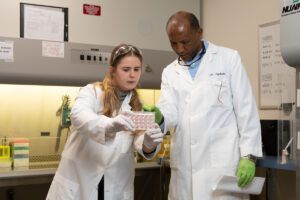Cutting-Edge Research
Tissue culture scientist Samantha Durand, MS ’22 creates a beating cardiac organoid in a win-win for her master’s degree and her professional work
For her master’s thesis in biotechnology, Samantha Durand proposed a scientifically ambitious and professionally strategic idea. She would attempt to create beating cardiac organoids from human-induced pluripotent stem cells—and the experiment would serve as a pilot project for MatTek Life Sciences, the tissue culture biotechnology company where she works full time as an associate scientist.
Scientists around the world have been working on the development of cardiac organoids—lab-grown masses of cells that replicate the functions of a human heart. These small tissue cultures hold significant potential for modeling heart development, studying disease and heart defects, and safely testing drug therapies. The scientific world is particularly interested in advancing cardiac organoid technology, as heart disease is the leading cause of death in the United States.
Durand had experience in tissue culture work, but had never attempted to create an organoid. Working in the MatTek research and development lab with support from her thesis committee, led by Professor Jennifer Hood-DeGrenier, she was able to create cellular-level cardiac tissue from iPS cells, cells that can be isolated and reprogrammed to have the potential to become any kind of human cell. The next step was to see if she could get the tiny tissue cultures to beat like a human heart.
“Creating organoids has a lot of steps, and Samantha was acquiring the knowledge as part of the training,” recalls MatTek Chief Science Officer Dr. Seyoum Ayehunie, who also supervised the work. “In the first experiments, she was able to go further but she couldn’t get it to beat. I told her to be patient and take it as far as she can.”
Durand kept at it—over the course of four weeks she ran several more attempts, making slight adjustments to the culture conditions in the hope of achieving a beating organoid.
“One day she called me and said, ‘I have a beating heart organoid,’” Ayehunie said. “Everyone was excited.”
(See video below of one of Durand’s beating cardiac organoids.)
That included her mentors at Worcester State. “When Sam emailed me the video of her first beating cardiac organoid, I was totally thrilled and immediately shared it with colleagues in the Biology Department,” said Hood-DeGrenier. “Scientists have been working to generate functioning organoids for many different types of organs, but cardiac organoids are especially awe-inspiring because you can see directly that they are doing their job because of the physical beating.”

Samantha Durand with MatTek Chief Science Officer Dr. Seyoum Ayehunie, who helped to supervise her research on cardiac organoids.
This type of research is on the cutting edge of cellular and developmental biology, said Hood-DeGrenier. “It’s terrific that Sam had the opportunity to participate in it as part of her master’s degree and to share it with others in the Worcester State community in her thesis defense.”
For Durand, the research—and her entire graduate experience at Worcester State—was a win-win, academically and professionally. The Dracut native had come to Worcester State with a bachelor’s degree in health sciences from Merrimack College and two internships at Pfizer under her belt. She hoped that graduate school would fill gaps in her education now that she was a working scientist. She defended her thesis in the fall and received her MS in December.
“My major was not specifically in biotech or biomedicine—it was more of a pre-med track,” she said. “I wanted to go back to school and gain more experience and take more classes that fit my interests. The classes at Worcester State were awesome. I loved every professor I had, and I was able to build relationships with most of them, and that’s really important to me.”
Today, Durand is working on an NIH grant to develop bronchial/tracheal epithelial models for SARS-CoV-2, which causes COVID-19. “A lot of new projects come in, and a lot of what I learned in grad school is applicable to what I’m doing now,” she said. “It’s given me background and ideas on different avenues we can pursue.”
Ayehunie is hopeful that the MatTek research and development team he leads can continue to advance Durand’s work on cardiac organoids. Development of a typical drug therapy, he said, costs upward of $2 billion and can take 10 to 12 years in clinical trials. “If we have appropriate models, those times can be shortened and the cost can be minimized,” he said.



